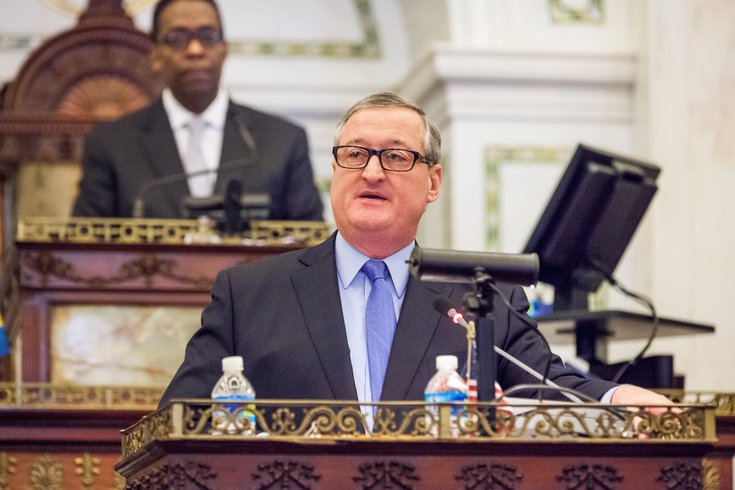
March 30, 2016
 Thom Carroll/PhillyVoice
Thom Carroll/PhillyVoice
Mayor Jim Kenney unveils his recommended 6-year fiscal plan for 2017-2022 before City Council, Thursday, March 3, 2016 at City Hall.
During the second day of hearings Wednesday to review the proposed capital budget for 2017 and a fiscal plan through 2021, Philadelphia City Council met with leaders from a variety of municipal departments. The purpose was to discuss the budget and examine how taxpayer money would be spent.
The council has until the end of May to approve the budget plan.
City Council members also looked at how the city can create more opportunities for businesses owned by minorities, women and the disabled.
City Councilman-at-Large Derek Green noted that the city has not done a good job of working with those business owners when soliciting RFPs – the requests for proposals for goods and services purchased by the city.
Green pressed Rebecca Rhynhart, the city's chief administrative officer, to address these issues that, he said, are long-standing.
"We should be using these dollars as a way to help the Philadelphia economy," Green said.
In fact, a report compiled by Mayor Jim Kenney's transition team pointed out that only 32 percent of city contracts were delivered to businesses owned by minority, women or handicapped individuals in the fiscal year 2015.
Rhynhart said city government is working to respond to Kenney's desire to increase those opportunities.
"We actually are changing," she said.
"We need to do a better job with how we leverage our assets," Green replied.
Council President Darrell Clarke, D-5th, asked city officials about planned improvements to city infrastructure, specifically the 22nd police district headquarters – in Clarke's councilmanic district at 17th and Montgomery avenues in North Philadelphia – which is in need of repairs.
Clarke raised the condition of the police building in last year's budget and said Wednesday that it remains in rough shape.
Councilman Bobby Henon, D-6th, said the 15th police district building on Levick Street, near Harbison Avenue, also needs improvements.
"The 15th police district is in extremely poor condition," he said.
Bridget Collins-Greenwald, who is commissioner of the city's Department of Public Property, said no specific renovation plans are yet in place for those buildings, but a plan will be unveiled later in the year to determine which facilities will get needed repairs.
"There will be a definitive answer," Rhynhart said.
Councilwoman-at-Large Helen Gym wanted to know how the city plans to cut the city's prison population by 34 percent over the next five years – a goal specified in a grant proposal sent by the city to the MacArthur Foundation. That $2 million grant, plus a pledge of $2 million in new and existing city funds, would be used to reduce inmate population.
Gym asked Mike Resnick, prisons commissioner, just how that could be done.
"It's going to take real and sustained change to the system," said Resnick. "Hopefully, we'll get there."
The city's prisons need repairs and improvements, Resnick said, noting the 20-year-old Curran-Fromhold Correctional Facility at 7901 State Road in Northeast Philadelphia has several "major technical failures."
Resnick said efforts to reduce prison population wouldn't hinge on the MacArthur grant, but that investment in the facilities would be necessary.
"We need to invest in our prisons," he said. "We are trying to get there."
His department and other law enforcement officials are committed to working together to reduce the prison population, Resnick said.
City Council is scheduled to resume budget discussions on Tuesday.